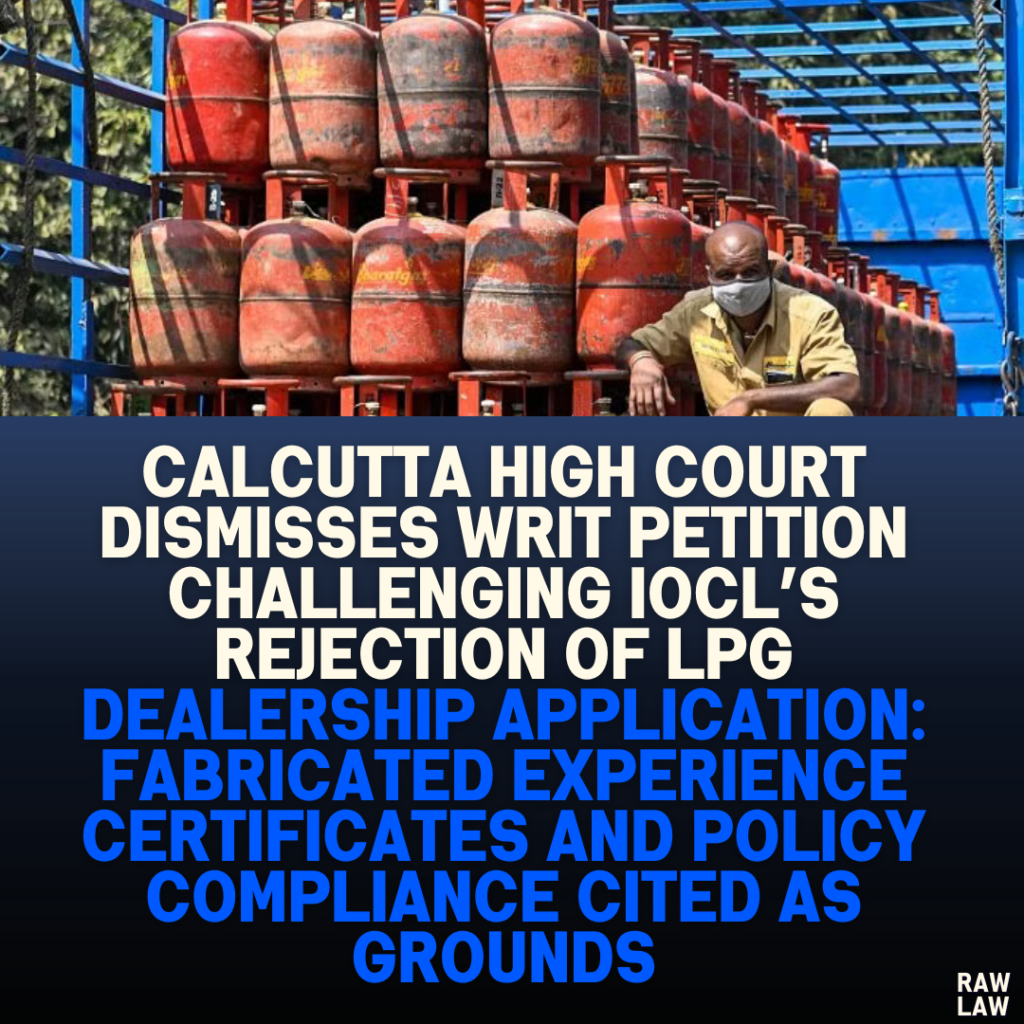Court’s Decision
The Calcutta High Court dismissed the petitioner’s writ petition, finding no merit in the arguments presented. The court upheld IOCL’s decision to reject the petitioner’s application for an LPG distributorship. The reasoned order issued by IOCL was found to be lawful and justified. The court concluded that the rejection of the petitioner’s application was based on discrepancies in the experience certificates and tampered documents provided by the petitioner.
Facts
- Advertisement for LPG Dealership:
- In 2007, IOCL issued an advertisement for an LPG distributorship reserved for Scheduled Caste candidates at Barrackpur/Kalyani Highway More.
- Petitioner’s Application:
- The petitioner applied for the dealership and was ranked first in the selection process.
- Field Verification:
- IOCL conducted a field verification of the petitioner’s experience certificate.
- It was found that the company, M/s Indo Blue Flames Private Limited, which had issued one of the certificates, did not exist at the address provided.
- The telephone number on the certificate was verified as non-existent in 1999.
- Rejection of Application:
- IOCL rejected the application on the grounds that the petitioner’s claimed two years of experience in the LPG business could not be substantiated.
- Allegations of tampered documents and discrepancies in the petitioner’s submissions were noted.
- Legal Actions by the Petitioner:
- The petitioner filed multiple writ petitions challenging IOCL’s decision and seeking the issuance of a Letter of Intent (LOI) in his favor.
- These petitions culminated in a reasoned order by IOCL following directions from a Co-ordinate Bench of the High Court.
Issues
- Justification of Rejection:
- Was IOCL’s decision to reject the petitioner’s application lawful and supported by evidence?
- Violation of Natural Justice:
- Did IOCL violate the principles of natural justice by conducting separate hearings for the petitioner and the private respondent?
Petitioner’s Arguments
- Fabrication Allegations:
- The petitioner argued that IOCL’s claim of fabricated documents was baseless.
- The owner of M/s Indo Blue Flames Private Limited had passed away, making verification difficult.
- Unfair Process:
- Separate hearings for the petitioner and the private respondent denied the petitioner an opportunity to counter the respondent’s arguments.
- The petitioner alleged that this amounted to a violation of the principles of natural justice.
- Supporting Documents:
- The petitioner provided additional documents, such as payment vouchers and receipts, to substantiate his experience, which were allegedly ignored by IOCL.
Respondent’s Arguments
- Tampered Documents:
- IOCL highlighted tampering in the petitioner’s documents, including discrepancies in telephone numbers and dates.
- The telephone numbers on the documents were verified with BSNL, which confirmed that eight-digit numbers did not exist in 1999.
- Policy Compliance:
- IOCL argued that the rejection was consistent with its policy, which required verifiable evidence of experience.
- Letter of Intent (LOI):
- IOCL justified issuing the LOI to the second-ranked candidate due to the petitioner’s inability to substantiate his experience.
- No Prejudice:
- The private respondent argued that the separate hearings caused no prejudice to the petitioner.
Analysis of the Law
- Verification Requirements:
- IOCL’s internal policy required experience certificates to be authentic and verifiable. The petitioner failed to meet these criteria.
- Principles of Natural Justice:
- The court observed that the petitioner was given sufficient opportunity to present his case.
- The lack of a joint hearing for the petitioner and the private respondent did not constitute a violation of natural justice, as the petitioner’s case hinged on the verifiability of his documents, not the respondent’s submissions.
- Evidentiary Standards:
- The discrepancies in the petitioner’s documents undermined their reliability, justifying IOCL’s decision.
Precedent Analysis
The court did not explicitly cite precedents but followed the general principles of administrative law, emphasizing the authority of administrative bodies to make decisions based on factual verifications and compliance with policy.
Court’s Reasoning
- Document Discrepancies:
- The court noted multiple discrepancies in the petitioner’s documents, including tampered dates and a non-existent telephone number.
- These discrepancies raised serious doubts about the authenticity of the petitioner’s claims.
- Fair Process:
- The court found that IOCL provided the petitioner with adequate opportunities to present his case.
- The separate hearings for the petitioner and the private respondent did not prejudice the petitioner, as the issue was the validity of the petitioner’s documents, not arguments made by the respondent.
- Judicial Deference:
- The court deferred to IOCL’s findings, as they were based on a detailed investigation and consistent with policy.
Conclusion
The court dismissed the writ petition, holding that IOCL’s decision to reject the petitioner’s application was lawful and based on valid reasoning. The court found no violation of natural justice or procedural irregularity.
Implications
This judgment underscores the importance of providing verifiable and authentic documents in administrative proceedings. It also highlights the limited scope for judicial intervention in administrative decisions supported by objective evidence and consistent with established policies.




Pingback: Supreme Court Enhances Accident Victim's Compensation to ₹48 Lakh, Highlighting Fairness for Lifelong Disability and Medical Needs - Raw Law